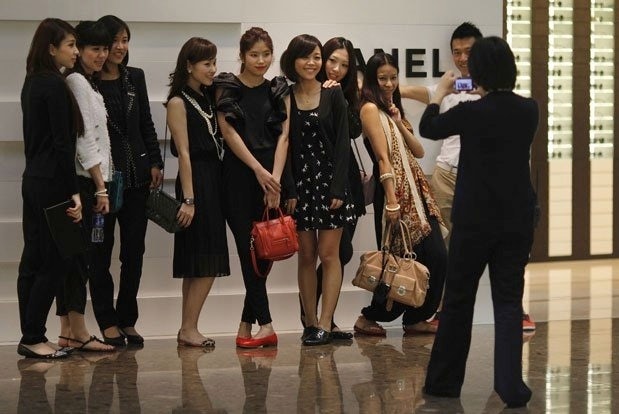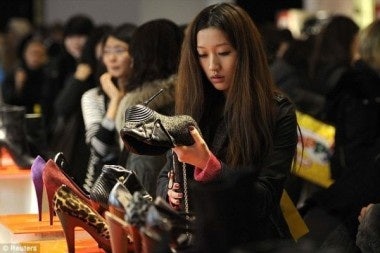Increased Financial Independence And Brand Sophistication Reshape Purchasing Trends#

Chic Chinese shoppers outside a Chanel store. (Reuters)
Since China’s "opening to the world," Chinese women have truly come into their own, gaining financial independence and empowerment despite the culture’s strong preference for men. In the list of the wealthiest female entrepreneurs in the world, 11 out of the top 20 are from China.
Outside the ranks of the super-billionaires, affluent and upper-middle-class Chinese women across the mainland are also making their mark in the mainstream of society. According to a lifestyle research study conducted by global advertising firm BBDO in China, over a fourth (26 percent) of the new generation of married female professionals already earn more than their husbands. The study also revealed that Chinese women of younger generations give as much importance to career advancement as their male counterparts.
Along with this newfound financial power comes the ability (and indeed the desire) to self-indulge through luxury goods shopping.
Research into luxury brand ownership among women indicates a big shift away from receiving gifts from men and towards self-purchasing. In fact, it’s not unusual for the average upper-middle-class woman to spend the equivalent of one or two months’ salary on a luxury purchase.

According to a lifestyle research study conducted by global advertising firm BBDO in China, over a fourth (26 percent) of the new generation of married female professionals already earn more than their husbands.
As the wealth of Chinese women has grown, their tastes have evolved. The stereotype of a Chinese luxury shopper is someone new to the world of luxury and lifestyle, who does not know her brands and wants only the biggest luxury logos to show off her wealth. The truth, however, is another story, especially among the newer generation of affluent Chinese.
Over the years, armed with greater wealth and more exposure to information through foreign travel and the Internet, Chinese consumers have become increasingly knowledgeable and sophisticated. The latest KPMG study of China’s luxury market, for instance, revealed that the average Chinese luxury consumer knew 59 brands in 2012 (up from 34 in 2006). Furthermore, their criterion for selecting luxury brands is changing radically. While “status” remains the most desired brand quality among 32 percent of the market, the preference for “connoisseurship” and “self-reward” has been growing faster compared to previous years--signalling a shift away from outward manifestations of prestige such as prominent logos to more personal sources of emotional gratification, such as the appreciation of a brand’s craftsmanship, history, and brand story.
This trend is especially pronounced in the top cities of Shanghai and Beijing, where Bain & Co. has learned that 65 percent of luxury consumers intend to buy fewer items with visible luxury branding.
Of course, Chinese women are leading the charge towards greater sophistication. According to BBDO’s research into affluent Chinese segments, 65 percent of women consider themselves leaders of fashion and design trends (versus 57 percent of men); and 60 percent of Chinese women believe they understand the history and cultural background of certain lifestyle brands (versus 56 percent of men).
In many ways, luxury brands have themselves been a force in the increased knowledge and lifestyle sophistication in China. From Louis Vuitton’s Voyages exhibition, Chanel’s Culture Chanel, to Cartier’s presentation at the Forbidden City in Beijing, luxury brands are no longer just purveyors of products but have become a curatorial influence in contemporary Chinese culture.
Nick Cakebread is Managing Director of integrated communications agency BBDO/Proximity Live, which helps brands engage with China’s growing group of high affluent consumers. The agency has worked with some of the world’s leading luxury brands including Tag Heuer, Fendi, Ralph Lauren, Corneliani and Loro Piana. Originally from London, Nick has worked in China for more than six years and within the Asia-Pacific region for more than eight.
(Opinions expressed by columnists do not necessarily reflect the views of the Jing Daily editorial team.)